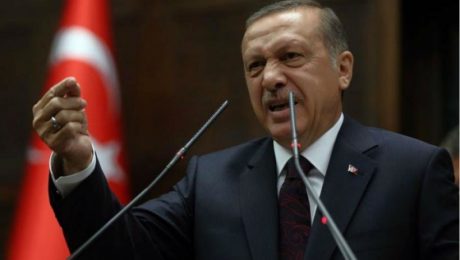Keyword: Defamation of Hizmet

Turks Should Question The Official Narrative That Gulen Was Behind The Coup
I am not trying to absolve one side or the other. The coup attempt was a heinous assault on Turkey’s civilian politics and the plotters must be punished in a fashion that deters similar actions in the future. What I am trying to understand is why everyone agrees that Gulenists did it when there is little evidence and that is even questionable.

Erdoğan’s former speechwriter: Call for Gülen’s return was tactical move
President Recep Tayyip Erdoğan’s former speechwriter and current Justice and Development Party (AK Party) deputy Aydın Ünal wrote on Thursday that Erdoğan has never liked Islamic scholar Fethullah Gülen and that his call for Gülen to return to Turkey in 2012 was a political maneuver.

Fethullah Gülen: ‘I Call For An International Investigation Into The Failed Putsch In Turkey’
I openly call on the Turkish government to allow for an international commission to investigate the coup attempt, and promise my full cooperation in this matter. If the commission finds one-tenth of the accusations against me to be justified, I am ready to return to Turkey and receive the harshest punishment.

Turkey Concedes: No Evidence Linking Gulen to Coup Sent to Washington
Turkey is conceding it has not sent any evidence to Washington linking Fethullah Gulen to the failed July 15 coup attempt, despite increasingly angry calls by Ankara for the United States to extradite the Pennsylvania-based cleric or suffer a severe downgrade in diplomatic relations.

Turkey introduces new decree law to seize all Gulen-related companies
Thanks to a new decree law released as part of the state of emergency declared late on July 20 following a failed coup, Turkey’s government is now set to seize all the Turkish companies owned by businessmen somehow linked to the US-based Islamic Scholar Fethullah Gülen.

India must understand Erdogan’s ideological motives for seeking extradition of Gülenists
Since its inception in India, Hizmet is known for its peace activism, interfaith dialogue and counter-extremism. Operating in the country through interfaith dialogue centres, educational institutions and cultural associations, it is articulating an evolving narrative of peace, pluralism and non-violence based on the spiritual ideas and principles of Gülen’s progressive and dialogic narrative of Sufism, as this research paper also elaborates.

What does Turkey deserve?
Once the remaining human capital exits Turkey, the country will be left to bigoted seculars and even more bigoted political Islamists. Given the shameful silence and support for the worst witch-hunt the country has ever witnessed, maybe this is what Turkey deserves: swaying between secular authoritarianism and popular Islamist dictatorship.

Local Turks [in Chicago] fear for safety of friends, family overseas after failed coup
“You see the pictures, ears cut off, eyes are bruised and noses are broken; they’re putting those pictures out,” Parlak said. “(Erdogan is) saying to the whole world, ‘I have the power and I’m going to do anything in my power and nobody can stop me,’ and that’s the part that is scary.”

Biden in Turkey: Holding the Line on Human Rights
This week, Vice President Joe Biden will travel to Turkey to meet with President Erdogan and Prime Minister Yildirim. This is one of the last opportunities for the Obama Administration to emphasize face-to-face how important it is to honor human rights and rule of law in the wake of the attempted coup of July 15.

Turkey’s ‘terrorists’ active in India. But who are they really?
Interestingly, Gulen was once an important ally of President Recep Tayyip Erdogan, and going by his ideology, comes across as a more moderate figure than Erdogan, who has been pushing an Islamic ideology which has little space for secularism. Till very recently, Erdogan’s policy being criticised for allegedly allowing Turkish territory to be used by terrorists.

Gulen Followers Living in Europe Receive Death Threats, Feel Intimidated
Turks who live in Germany, Belgium, the Netherlands, France and Switzerland and have links to the co-called Gulenist movement say they are frightened amid Turkey’s crackdown on Gulen’s followers, according to media reports. MOSCOW (Sputnik) — Some Turkish people living in Europe who have links to supporters of Fethullah Gulen, accused by Ankara of masterminding the July 15 thwarted coup, have […]

Irvine’s new arrivals — Turkish asylum seekers, after a failed coup and a sadly successful purge
The man, who ran a nonprofit that provided humanitarian aid, doesn’t want to be identified because he fears for the safety of the wife and two children he was forced to leave in Turkey. They are hidden in a different city, he said, not far from his hometown. They’ve thrown away their cellphones and erased their social media accounts for fear of being tracked down by a government that no longer welcomes them.

Coup attempt in Turkey puts Tulsa Turks in difficult position
Muhammet Ali Sezer, the incoming executive director of the Raindrop Turkish Cultural Center, said it will be impossible for him to return to his homeland unless the political situation improves. “If I go back to Turkey, I don’t know what they will do to me,” said Sezer. He also said he fears for his father and brother who live in Turkey.



















